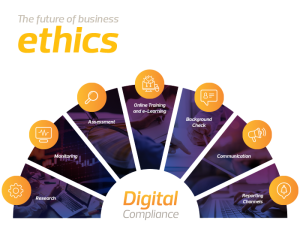With companies’ technological tools improving and their vulnerabilities mounting, Ethics and Compliance programs must evolve in step. According to a study conducted by KPMG in Brazil, only 2% of the 250 companies surveyed invested more than R$2 million in Compliance in 2015. However, in 2016, 9% of the 250 companies analyzed invested over R$2 million in the topic, which represents significant growth in a short span of time.
But, given the rapid development in digital tools, what is being done to bring Compliance practices into this new era? “Companies have become basic agents of the globalized world. Consequently, this represents a greater effort to ensure transparency, integrity and ethics in their business activities,” said Camilla Jimene, a partner at Opice Blum Advogados Associados, a law firm specializing in technology matters, cyber fraud and digital compliance. “A highly effective way to preserve the strength of the corporate culture, while promoting policies in a reasonable timeframe and with frequent maintenance, is to disseminate information via digital means,” Camila added.
Ethics, Integrity and Transparency in digital environments
“From the compliance perspective, technology can help in three main points: online training for professionals; internal controls using technological resources to monitor tools and communications within the company; and reputational checking through the use of Big Data, which ensures greater investigative accuracy and more secure businesses,” explained Camilla. E-learning training tools (learning via digital platforms) are already widely adopted in the business world, especially at decentralized companies with team members spread across different regions. Monitoring via digital tools is also very common, but the use of Big Data to identify risks is still a process undergoing improvement.

Camilla Jimene, partner at Opice Blum: “Globalization demands that businesses be more transparent, upstanding and ethical”
With data processing technologies continuing to advance, it is possible to collect public information about the entire value chain much more easily and quickly. In practice, this means that companies are able to conduct precise studies of their clients, partners, suppliers and distributors based on information available on the Internet and in public databases. If there is any restriction or risk, the company is able to identify it quickly. “It is possible to cross reference all public information found on the web to generate a decision. This makes it easier to identify whether those involved meet the company’s Ethics and Compliance criteria, as well as the compatibility of their principles and culture, which has an impact when it comes to doing business,” said Camilla.
Digital media also are important instruments for communicating Compliance policies and guidelines. Intranet, e-mail and corporate social networks are efficient resources in this task, enabling all employees to be aware of their rights and duties. In addition to disseminating information, tools such as independent whistleblowing channels and Ethics and Compliance portals are essential for receiving questions, concerns and complaints anonymously and without interference from third parties.

Digital resources can be used in many different processes of the Compliance department
Compliance as human factor
Several advances that make the business environment more sustainable are expected in the coming years. Whether in artificial intelligence, Internet of Things (IoT), training programs using virtual reality or cloud-based data, the topic clearly will undergo many innovations.
Camilla, however, makes one caveat about this scenario. “We’re talking basically about values. So, despite the fact that it is a facilitating medium, digital environments are not an end to things. They never should replace ‘face-to-face’ interactions when the subject is corporate policy. It must be a replicator, a disseminator of knowledge. In this case, relations between people and technologies must be symbiotic and complementary, since the development of values continues to be performed by us human beings,” she concluded.
